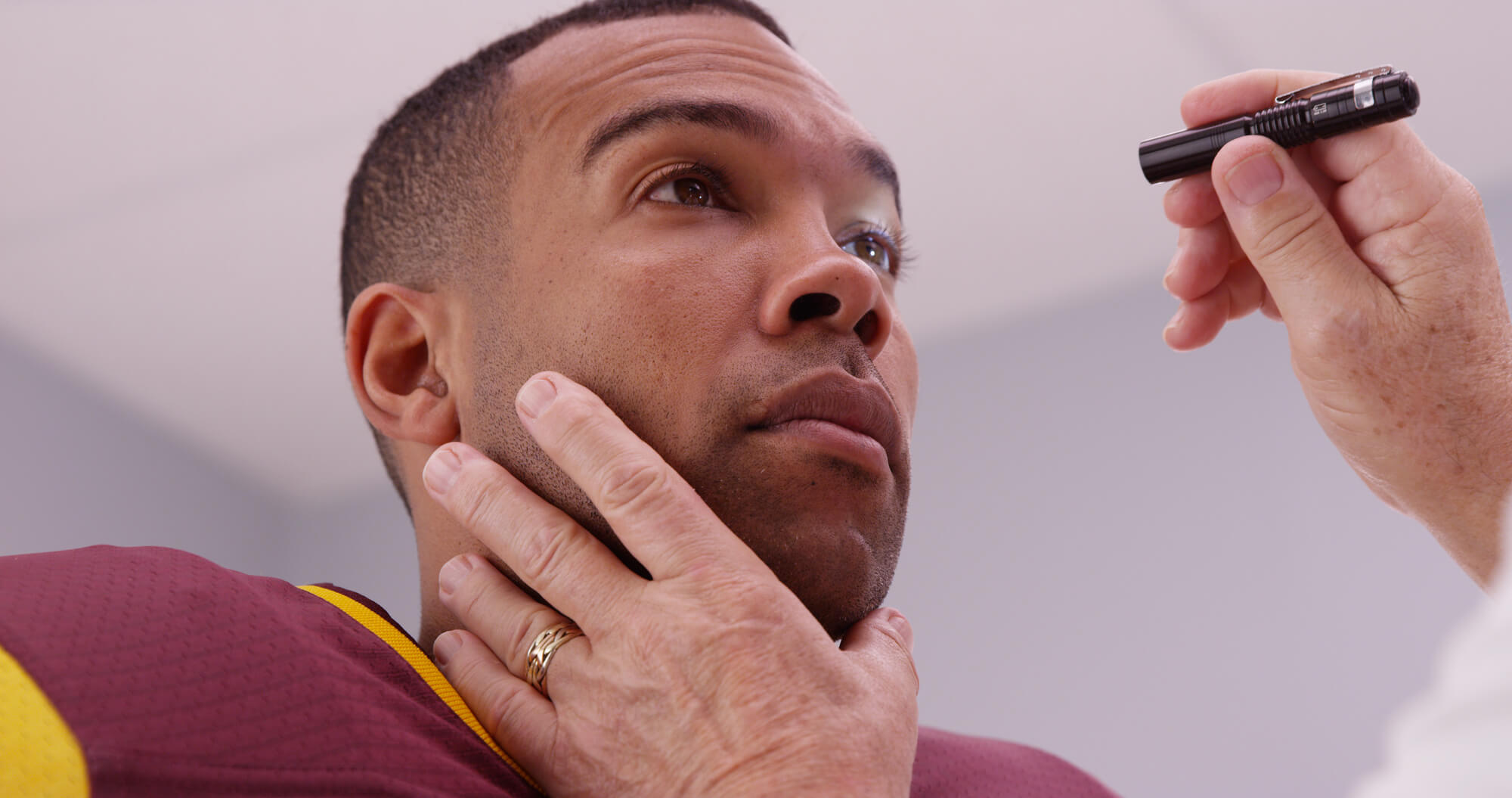
According to Dr. Bert Vargas, Director of the Sports Neurology and Concussion Program at UT Southwestern Medical Center, 95% of individuals suffering from a concussion experience post-traumatic headache, and about two-thirds of those will experience migraine symptoms or features.
A concussion is considered a traumatic brain injury (TBI), although relatively minor. Someone with a concussion has a high probability of post-traumatic headache (PTH), although not necessarily a migraine. Most concussion symptoms resolve within three to six weeks, including headache symptoms. If the symptoms last longer than six weeks, they are unlikely to resolve themselves.
A 2017 study found that 51% of people with TBI experience headaches within two weeks after the injury. About a quarter of those with headaches reported them to persist for more than three months. Also, persistent headaches were more common in women and people who came to the emergency room for head pain.
Other studies from 2018 found that people with PTH have less gray matter by thickness and volume in many areas of the brain shortly after their injury occurred compared to a control group.
So, do migraines occur as a result of a concussion? The short answer is yes, but this post gives you more detail about concussion-derived migraines.
Defining Concussions
A concussion results from a blow to the head or an action that causes the head to move quickly forwards and back, like whiplash. Essentially, the brain sloshes around in your skull, and the protective fluid can't completely prevent it from striking bone.
A concussion can damage the brain's physical or chemical structure, and symptoms experienced afterward are collectively called post-concussive syndrome. You are more likely to suffer post-concussive syndrome if you experience multiple concussions, as do football players and boxers.
You don't need to lose consciousness to be diagnosed with a concussion, nor do you need to suffer a direct blow to the head. Dr. Amaal Starling, Assistant Professor of Neurology at the Mayo Clinic in Phoenix observes that less than 10% of people with concussion actually lose consciousness, so it isn’t a great diagnostic marker.
People with a family history of migraine and women have a higher risk of developing post-traumatic headache disorders, specifically migraines. Post-traumatic headaches that last more than three months after the TBI is considered persistent.
The neurovascular components of migraines and concussions are similar, so the physiological effects of a concussion can increase the intensity or frequency of migraines, particularly if you are predisposed to them.
Symptoms
Post-traumatic headache symptoms include headache, nausea, memory problems, sensitivity to light or sound, and poor concentration. Post-concussive syndrome also includes:
- Speech difficulty
- Irritability
- Tinnitus
- Fatigue
- Mood problems
- Suicidal ideation
Post-concussive syndrome includes migraines as well as ocular migraines and sinus, hypertension, cluster, and autonomic nervous system headaches. Migraines are typically intense headaches that throb or pulse on one side of the head. Someone with a migraine may be sensitive to light, sound, or odors and experience nausea or vomiting.
Migraines can also cause people to faint, lose their vision or suffer blurred vision, or feel worse pain from light movements.
A study in 2014 suggested most people with post-traumatic headache experience head pain daily or weekly, while others have less frequent headaches. Most headaches lasted from a few minutes to a few hours.
Sometimes, headache symptoms last years after a head injury occurs. However, there are options to prevent headache progression, especially identifying concussions early and seeking professional medical help.
Diagnosing and Preventing Concussions
Each concussion is unique. Immediate assistance from a healthcare professional is crucial to identify and treat it. Early treatment can reduce the risk of complications and help mitigate persistent headaches and other symptoms.
If you have severe symptoms or complicated medical history, you should consult a headache specialist who can suggest appropriate treatments and uncover secondary headache causes that might be separate from migraines.
You can prevent concussions by doing the following:
- Wearing a seatbelt when riding in or driving a motor vehicle
- Driving only when you are alert and sober
- Wearing protective headgear for sports and recreational activities
- Preventing falls, especially for older people
- Using child safety gear in living and playing areas
Not every concussion is avoidable, but mitigating the most common circumstances that can lead to concussion is prudent and reduces the chances of traumatic brain injury.
Treatment
Most healthcare providers treat post-traumatic headaches like the type of head pain it resembles, such as migraine or tension headaches. There are no specific treatments approved for PTH.
In some cases, cognitive behavioral therapy and non-pharmacological treatments result in a good response as a complement to other therapies. Concussion registries and ongoing research might expand the treatment options for the post-concussion migraine population.
Providers rarely use surgery to ease or eliminate migraines; typically, around 1.5% of patients receive surgery. Some medication carries a high risk for dependence and mood alteration, such as opioids and barbiturates, which are not considered effective migraine treatments in the first place.
Triptans can help shrink swollen blood vessels in the brain. Doctors have other medications in their migraine treatment arsenal:
- Ergotamines
- Anti-emetics (for nausea and vomiting)
- Tricyclic antidepressants
- Monoclonal antibodies
- BOTOX(R) injections to the head or neck
The right treatment for an individual's case is determined by a healthcare professional.
When to See a Doctor
If you believe you suffered a concussion, seek immediate medical assistance. If the headaches become more frequent or intense or don't resolve themselves, speak with your doctor as soon as possible.
A medical professional can provide treatment options or refer you to a neurologist for treatment if needed.


